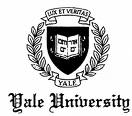Anyway, today started at 5:00 A.M. Stephanie and I planned on doing laundry, but ran into a little mishap. The laundry room is located in the basement, which the both of us knew was on the lowest level of our TD (Timothy Dwight) building. When we got downstairs, however, there were three different doors and we had no clue which one to go to. Our failure sadly brought us back upstairs, awake at 5:00 A.M. for no reason. Yet since we were awake, we decided to go outside and read/prepare for our morning/evening lectures. Breakfast came soon after, and soon, it was lecture time!
Our first lecture was by Dr. Luong, about China and the prediction that China will be the dominant superpower of the 21st century. The presentation was very interesting and thorough; it definitely sparked questions about...what will actually happen in the future - the future that our generation will be an important part of.
After lunch, we had another lecture by Dr. Luong about Professional and Personal Etiquette and Social Skills. I loved this presentation the best, and I know that it will be of great use. One main part was about shaking a person's hand. He went over 10 handshakes to avoid and we were able to "practice" by shaking our neighbors' hands. Introductions were another important part, as well as socializing during business events. Lastly, he mentioned the proper manners when dining, such as not to slurp when drinking soup. What I realized during the lecture was the fact that most of the topics he touched on were mentioned in the book, Never Eat Alone! Of course, I also learned how to properly shake hands with someone during my computer Networking class at El Cerrito (from the IT Academy).
For dinner, Yohanna, Stephanie, and I went to a Pizza restaurant near the campus. It was our "break time" and I got a chance to call some of my relatives and friends back at home while waiting for the food. It was a great time to connect back with those at home.
Later that night, the rain came pouring down. Hard. Thunder boomed and the lightning flashed throughout the dark sky and luckily, we were all in a building, listening to another lecture. Some people were in a philosophy session, and others were in the Civil Rights session (like me). Anthony Berryhill was our speaker for Civil Rights and the Grand Strategy behind it.
Afterward, we worked with our groups on our Marshall Brief policy. Speaking of which, tomorrow, the rough draft is due! I must say, I still have much more to write and actually 2 essays due on Sunday. So I will start posting pictures and then be on my way.
By the way, as a compensation for not blogging yesterday, here are some pictures:
 On the left: This is me with a new friend (again!). His name is Christopher "Chris" Smiles. He will be a rising Junior at St. Andrew's School in Boca Raton, Florida. Similar to Stephanie, I found out that Chris knows how to play the violin! Stephanie and I met Chris yesterday after we asked him to do us a favor and take a picture of us with the staff (refer to Stephanie's blog for the image). We were very thankful for his help and thus began a new friendship.
On the left: This is me with a new friend (again!). His name is Christopher "Chris" Smiles. He will be a rising Junior at St. Andrew's School in Boca Raton, Florida. Similar to Stephanie, I found out that Chris knows how to play the violin! Stephanie and I met Chris yesterday after we asked him to do us a favor and take a picture of us with the staff (refer to Stephanie's blog for the image). We were very thankful for his help and thus began a new friendship.
On the right is Bryce Adams. He is our "instructor" for the Marshall Brief Policy project. Bryce has been a great help to our project and his amazing knowledge in almost "everything" has surprised me. Bryce graduated Yale in 2008 and was a part of the Ivy Scholars program when he was our age. I hope to learn more about him and from him as we spend more time together in our groups!

This is Stephanie and I in front of the Sterling Memorial Library (this morning, before the rain came). Well, thanks for reading. Bye!






























